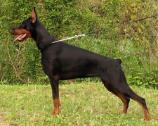
This is a placeholder text
Group text
by Tngsd on 11 February 2009 - 13:02
Tennessee
House Bill 386, sponsored by Rep. Janis Baird Sontany (D-53), and its companion legislation, Senate Bill 258, sponsored by Sen. Doug Jackson (D-25), would place the hobby breeding of purebred dogs under criminal animal cruelty statutes and set severe limits on dog ownership. These bills were introduced Monday, Feb. 9, 2009.
While this legislation is called the “Commercial Breeder Act,” in reality it ensnares many hobbyists, trainers and handlers in their net. These bills are typical of HSUS-promoted legislation, which misrepresents its true purpose.
The legislation defines a “commercial breeder” as “any person who possesses or
maintains twenty (20) or more adult female dogs in whole or in part for the
purpose of the sale of their offspring as companion animals.” The words “in part” means that breeding even one female makes a kennel owner a commercial breeder, and the inclusion of the words “possesses or maintains” entraps many professional trainers, handlers, private rescue networks, hound pack owners, boarding kennels and hunt clubs in the definition.
Here are some of the provisions:
- Anyone who meets the definition of a commercial breeder must be licensed and inspected, and comply with complex regulations for the care and housing of dogs. License fees will be costly - $500 annually for up to 40 dogs, $1,000 annually for more.
- No one can own more than 75 dogs. This includes partnerships, companies and corporations, as well as individuals.
- A dog or cat cannot be euthanized, except by a licensed veterinarian. This provision will cause great suffering in severely injured or ill dogs when a veterinarian cannot be located.
- To be eligible for a license, state officials must investigate and pass judgment on a person’s “character,” and also on the suitability of the kennel’s location.
- Licenses can be suspended or revoked for several reasons. A hearing is provided only through the Department of Agriculture, not to the courts.
- State inspectors have unlimited access to the home, facilities and property of anyone who owns a licensed kennel, or an unlicensed kennel. Constitutional requirements for search warrants and probable cause would be trampled.
- The state would be given unlimited power to confiscate animals from noncompliant kennels, and could enter into cooperative agreements with local, statewide or national animals rights groups such as HSUS. The kennel owner would have to post a bond to cover th
Contact information Disclaimer Privacy Statement Copyright Information Terms of Service Cookie policy ↑ Back to top




